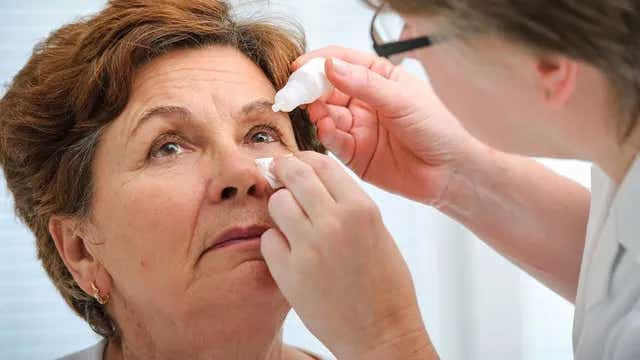Life-changing eyedrops could replace injections for common eye disease
Study puts the spotlight on an innovative eye drop solution that could replace the practice of injecting medication directly into the eye

[July 14, 2023: Staff Writer, The Brighter Side of News]
The drops are meant for people dealing with Presbyopia, an age-related eye issue that causes blurry vision. (CREDIT: Creative Commons)
In a groundbreaking development for the treatment of retinal vein occlusion (RVO), a study by Columbia University researchers proposes a new potential therapy that promises to be both more comfortable and more effective than the existing method. The study puts the spotlight on an innovative eye drop solution that could replace the current practice of injecting medication directly into patients' eyes.
Retinal vein occlusion, a common eye disease affecting up to 2% of people aged 40 and over, manifests when a vein in the retina becomes obstructed, leading to eye inflammation, swelling, retinal damage, and, in many cases, vision loss.
The standard treatment for this condition is the administration of a vascular endothelial growth factor inhibitor (anti-VEGF), usually via an intraocular injection. This therapy, though effective in reducing swelling and improving vision, often results in less than favorable outcomes for patients suffering significant retinal damage due to impaired blood flow.
"Anti-VEGF therapy has helped a lot of people with RVO, but the fear factor—having to get a needle in the eye—causes many people to delay treatment, which can lead to retinal damage," explains Carol M. Troy, MD, PhD, Professor of Pathology & Cell Biology and of Neurology at Columbia University Vagelos College of Physicians and Surgeons. As per Dr. Troy, there's an urgent necessity for a more patient-friendly alternative to combat this disease, a significant cause of blindness worldwide.
Related News
The recent study by Columbia University researchers provides a glimmer of hope in this context. The study found that their experimental eye drop treatment was twice as effective as the standard injection therapy in reducing swelling and improving blood flow within the retina in mice with RVO.
Interestingly, the eye drops also proved capable of preventing the deterioration of the retina's neurons, known as photoreceptors, and preserving visual function over time. In contrast, the standard injections had no similar protective effect.
An intriguing element of these eye drops is their active ingredient, an experimental drug designed to inhibit caspase-9, an enzyme that sets off cell death. Dr. Troy's lab discovered that this enzyme is excessively active in the blood vessels damaged by RVO.
Mouse model of retinal vein occlusion. Diagram depicts experimental plan showing timing of treatment administration and retinal imaging in a mouse model of RVO. (CREDIT: Frontiers of Neuroscience)
Maria I. Avrutsky, PhD, the study's first author who conducted the research as a postdoc in Troy's lab, shared, "We think the eye drops improve the health of blood vessels in the retina, which then decreases the toxic signaling that damages the retina's neurons and leads to vision loss."
The researchers have set their sights on preparing for human clinical trials with the eye drops, and they aim to identify additional therapeutic targets. "Finding the root cause of RVO is the holy grail, but if we can at least provide better symptomatic relief that doesn't distress patients, it would be a really good start," Troy adds.
OCT representative images. Figure depicts representative longitudinal OCT scans from an uninjured animal and animals induced with RVO from each treatment group at days 1, 2, and 8. Representative H&E retinal histology sections depicted at right, scale bar = 20 μm. (CREDIT: Frontiers of Neuroscience)
This monumental study, titled "Caspase-9 inhibition confers stronger neuronal and vascular protection compared to VEGF neutralization in a mouse model of retinal vein occlusion," was published online in the Frontiers of Neuroscience.
The list of authors includes Maria I. Avrutsky (Columbia, now at Character Biosciences), Claire W. Chen (Columbia), Jacqueline M. Lawson (Columbia), Scott J. Snipas (Sanford Burnham Prebys Medical Discovery Institute, La Jolla, CA), Guy S. Salvesen (Sanford Burnham Prebys), and Carol M. Troy (Columbia).
Note: Materials provided above by The Brighter Side of News. Content may be edited for style and length.
Like these kind of feel good stories? Get the Brighter Side of News' newsletter.
Joseph Shavit
Head Science News Writer | Communicating Innovation & Discovery
Based in Los Angeles, Joseph Shavit is an accomplished science journalist, head science news writer and co-founder at The Brighter Side of News, where he translates cutting-edge discoveries into compelling stories for a broad audience. With a strong background spanning science, business, product management, media leadership, and entrepreneurship, Joseph brings a unique perspective to science communication. His expertise allows him to uncover the intersection of technological advancements and market potential, shedding light on how groundbreaking research evolves into transformative products and industries.



